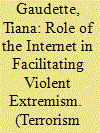| Srl | Item |
| 1 |
ID:
190864


|
|
|
|
|
| Summary/Abstract |
During recent years, the inclusion of former extremists in preventing and countering violent extremism (P/CVE) has increased internationally. This paper addresses the issue of the involvement of former extremists in school-based work to prevent violent extremism. It provides a media analysis of the content of 151 newspaper articles (published between 2001 and 2019) regarding 133 lectures given by former extremists in German schools. The analysis shows that the lectures contain mostly movement- and biography-based narration and points to some critical aspects (e.g., detailed depictions of violence, insensitive language). Furthermore, the findings indicate that some former extremists engaging in PVE might not have completed the deradicalization process. Moreover, certain former extremists could have further motives for engaging in prevention work in schools, in addition to making amends for previous actions. Among them appears the need for a compensation mechanism or a platform to advertise their activities. Therefore, we emphasize the importance of a differentiated view of former extremists’ role in PVE, especially when working with children and juveniles.
|
|
|
|
|
|
|
|
|
|
|
|
|
|
|
|
| 2 |
ID:
188081


|
|
|
|
|
| Summary/Abstract |
While a growing body of evidence suggests that the Internet is a key facilitator of violent extremism, research in this area has rarely incorporated former extremists’ experiences with the Internet when they were involved in violent extremism. To address this gap, in-depth interviews were conducted with ten Canadian former right-wing extremists who were involved in violent racist skinhead groups, with interview questions provided by thirty Canadian law enforcement officials and ten community activists. Participants were asked about their use of the Internet and the connection between their on- and offline worlds during their involvement in the violent right-wing extremist movement. Overall, our study findings highlight the interplay between the Internet and violent extremism as well as the interactions between the on- and offline worlds of violent extremists. We conclude with a discussion of study limitations and avenues for future research.
|
|
|
|
|
|
|
|
|
|
|
|
|
|
|
|